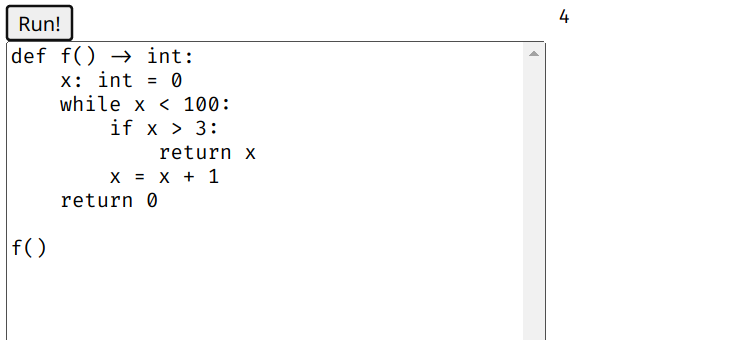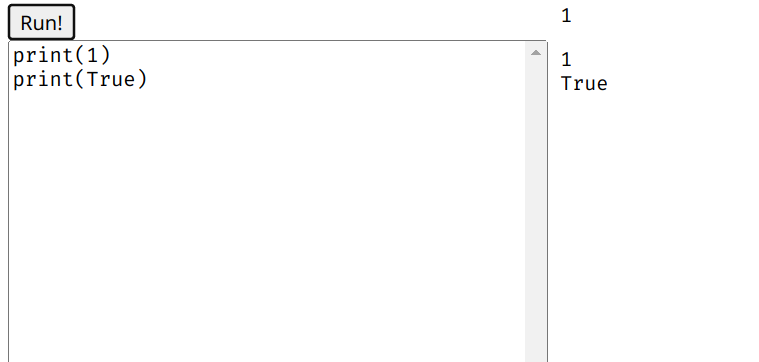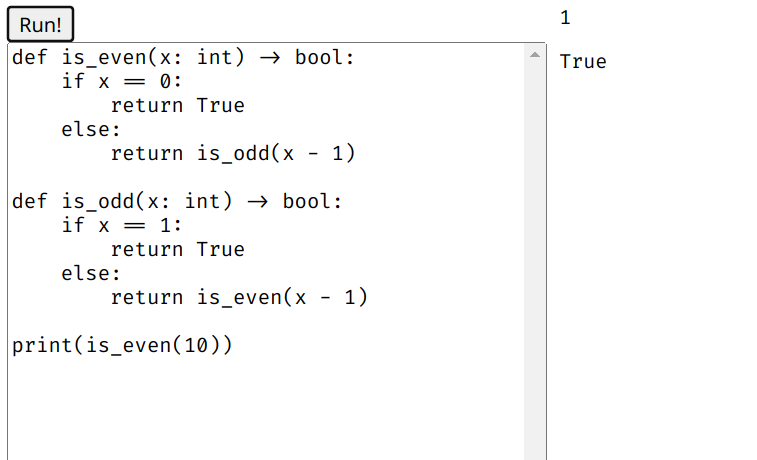Ruochen Wang
All types are represented as i32 in webassembly. The integers are just represented straightforwardly as i32. For booleans, I use 1 for True and 0 for False. For none, I just represent it with 0. The exact value is not relevant since there's only one possible value of type none.
When printing booleans, first the compiler will choose the right function base on the type. In the print_bool function, I check if the value is 0 or not. If it's 0, then print "False", otherwise print "True".
case "call": {
const valStmts = expr.args.flatMap(codeGenExpr);
let funcname: string;
if (expr.name === "print") {
const argtype = expr.args[0].a.typ.tag;
if (argtype === "func") {
throw new TypeError("Cannot print a function");
} else {
funcname = `print_${argtype}`; // Choose the right print function
}
} else {
funcname = expr.name;
}
return valStmts.concat([`(call $${funcname})`]);
}console.log(arg === 0 ? "False" : "True");
Program:
glob: int = 0
def func(x: int) -> bool:
y: bool = False
if x > 0:
return y
else:
return not y
print(func(glob))typecheck phase
The variables are stored in a structure called scope. The scope is an array of maps that map from identifier names to types. The 0-th element of the scope is the map for global identifiers. If the scope has more than one element, it means we are in a function and the 1-st element is the map for the local environment of the function.
Global variable: when typechecking declarations, we add the variable and its
type to the 0-th element of the scope. (Location in code: tc.ts:190)
Function argument: when typechecking a function, we add a new map to the scope,
which is the 1-st element. We then add the argument types to the 1-st element of
the scope. (tc.ts:224)
Local variables: after adding the function arguments to the scope, we add the
local variables to the 1-st element of the scope. (tc.ts:224)
Also for places that references the variables (id expressions and assignment
statements to the variable), I store an isGlobal flag with the expression or
statement for the codegen phase. (tc.ts:33 and tc.ts:114)
codegen phase
I don't store any information for the variables in the codegen phase apart from
the isGlobal flag.
The program I tested was
while True:
passThe webpage just freezes.
The first line of the output is the return value of the program. The rest are the output of print calls.
A program that reports a type error for adding a number and a boolean where one operand is a call expression and the other operand is a variable
A program that has a type error in a conditional position (the condition part of an if or while), where that position is a non-global identifier (function parameter or local variable)
A program with a loop that has multiple iterations, and calls a function on each iteration (it can be the same function)
A program that returns from the body of a loop, and not on the first iteration of the loop
Printing an integer and a boolean
A recursive function that terminates
Two mutually-recursive functions that terminate
In the first example, when we are type checking a binary operator, we first get the argument types of that operator, then compare the types of the expressions around the operator with the argument type. If one of the types doesn't match, there's a type error.
export const BINOP_ARGS: { [key: string]: Type[] } = {
"+": [{ tag: "int" }, { tag: "int" }], // <-- type of the arguments of the + operator
"-": [{ tag: "int" }, { tag: "int" }],
"*": [{ tag: "int" }, { tag: "int" }],
...
};
// in tcExpr():
case "binop": {
const argType = BINOP_ARGS[e.op];
...
const leftType = tcExpr(e.left, scope);
const rightType = tcExpr(e.right, scope);
const verb = BINOP_VERB[e.op];
if (!sameType(leftType, argType[0]) || !sameType(rightType, argType[1])) { // <-- typecheck
const showverb = verb === "compare" ? verb : `\`${verb}\``;
throw new TypeError(`Cannot ${showverb} ${leftType.tag} with ${rightType.tag}`);
}
return retType;
}





